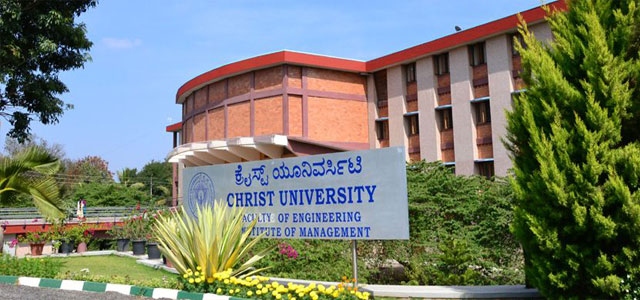CHRIST UNIVERSITY MSC EDUCATIONAL PSYCHOLOGY COURSE OVERVIEW
The postgraduate course provides a holistic outlook to the mysteries of human behavior. The curriculum includes theoretical and practical concepts that help to research and understand the working of the human mind and various aspects of human behavior. It focuses on how human beings behave differently under different circumstances. Candidates who are curious about human knowledge, working of the mind, processing of human emotions and behavior, and moral and scientific reasoning will greatly benefit from this course. The Placement Cell encourages fresh talent and provides multiple diverse career opportunities in various specializations.
Candidates who take up the MSc Educational Psychology course in Christ University Bangalore will have diverse knowledge about psychology and its applications in education, understanding, and counselling. The curriculum includes an opportunity to engage with information, knowledge, skills, policies, and holistic practices. The course helps the students to sharpen their empathy, patience, listening skills, and gain knowledge about various other aspects of modern psychological theories with an educational perspective. The course is an intellectual collaboration with the University of Massachusetts, Amherst and Washington State University.
Skills like understanding, communication, logical reasoning, decision-making, confidence, and entrepreneurship are enhanced through tools like case studies, written assignments, viva, dissertation, presentations, seminars, internships, projects, workshops, and guest lectures included in MSc Educational Psychology in Christ University.
DURATION OF MSC EDUCATIONAL PSYCHOLOGY COURSE IN CHRIST UNIVERSITY
-
2 years (4 semesters)
-
Full time, Postgraduate Programme
AFFILIATION & APPROVALS
-
Government of India
-
Deemed-to-be University
-
Accredited by NAAC
-
Approved by UGC
PROGRAM OBJECTIVES
-
To provide a strong foundation in Educational Psychology
-
To promote deep understanding and reflection of concepts to keep up with the demand of higher efficiency in national/international organizations
-
To create graduates who can carry out systematic reflection and scientific research
-
To provide practical experience and exposure so that candidates can have a broad field of vision
-
To develop and enhance skills like analytical reasoning and understanding
-
To integrate ethical and holistic values and to develop competent and confident individuals
PROGRAM OUTCOME OF CHRIST UNIVERSITY MSC EDUCATIONAL PSYCHOLOGY
-
Graduates with a strong foundation in Educational Psychology
-
Graduates who can understand and reflect on the theoretical concepts to keep up with the demand of higher efficiency in national/international organizations
-
Graduates who can carry out systematic reflection and scientific research
-
Graduates with a broad field of vision
-
Graduates who have excellent analytical reasoning and understanding skills
-
Graduates who can integrate ethical and holistic values and to develop competent and confident individuals
ELIGIBILITY OF MSC EDUCATIONAL PSYCHOLOGY IN CHRIST UNIVERSITY
-
Minimum 50% aggregate in Bachelor’s degree in any stream or specialization from a recognized Board in India
-
Candidates in the final year of their studies with 50% aggregate or above in all the semesters/years of Undergraduate Examination conducted
IMPORTANT DATE
Admission open - 08 December 2020
Admission close - 31 May 2021
FEE STRUCTURE FOR 2020
The fees structure for MSc Educational Psychology in Christ University can be summarized as:
Admission Registration: ₹5000
|
Karnataka |
Other States |
NRI |
SAARC/AFRICA/OCI/PIO/ASIAN |
Other Foreign Nationals | |
|---|---|---|---|---|---|
|
First Year (Semester I, II) |
₹ 94500 |
₹ 104500 |
₹ 180000 |
$ 2500 |
$ 3000 |
|
Second Year (Semester III, IV) | ₹ 94500 | ₹ 104500 | ₹ 180000 | $ 2500 | $ 3000 |
APPLICATION PROCESS OF MSC EDUCATIONAL PSYCHOLOGY IN CHRIST UNIVERSITY FOR 2020
Candidates frequently wonder what is the admission procedure for MSc Educational Psychology in Christ University? This can be summarized as:
-
The candidates must apply online when the applications are available on the University website https://appstat.christuniversity.in
-
Register with Name, Email ID and Password
-
Fill all the information that is required
-
Submit the Application Form
-
Make payment using card and click on Submit
-
A 9-digit Application Number will be generated
-
Applications close approximately 1 week before the scheduled selection process
-
Selection Process - Application Form printout, original documents and a set of photocopies on the allotted date, time and venue mentioned on the Admit Card
Required Documents:
-
Copy of Class 10 and Class 11/ 12 Marks Card
-
Transfer Certificate of Class 12
-
Degree Marks Cards (whichever is available years/semesters marks card)
-
Provisional Degree Certificate or Degree Certificate (Convocation Certificate)
-
Transfer Certificate (TC) of undergraduate degree from the last qualified institution
-
Migration Certificate of undergraduate degree from qualifying University (not for Karnataka candidates)
-
Copy of valid ID proof (Aadhar Card/Aadhar Enrolment Receipt/PAN Card/Voter ID)
-
PIO/OCI/SAARC/AFRICA/ASEA /OTHER FOREIGN NATIONALS Categories must send the required supporting documents – Copy of Passport, Copy of PIO/OCI Card, Copy of Degree Marks Cards)
-
Baptism Certificate from the Parish Priest/Pastor for Karnataka Christian Students
-
Recent passport size photograph (with white background)
ADMISSION FOR INTERNATIONAL STUDENTS
-
The International Student Category includes Foreign Citizens/PIO Card Holders/OCI (Dual Citizens)
-
The candidates from non-English speaking countries should produce evidence of passing the qualifying examination in English medium or have IELTS score 6.0/TOEFL (paper) 550/TOEFL (computer) of 213/TOEFL (IBT) of 79 scores
-
Application Process – Direct Mode Application/Online Application Form
-
The candidates will have to pay the International Student Category Fee
ADMISSION FOR NRI STUDENTS
-
The candidates will have to pay the NRI Fee
-
Foreign Venues for Selection Process: Kuwait and Dubai (UAE) and Doha (Qatar)
-
Admission is based on academic performance and Selection
ADMISSION PROCESS FOR MSC EDUCATIONAL PSYCHOLOGY IN CHRIST UNIVERSITY FOR 2020
Candidates frequently ask what is the admission process for the MSc Educational Psychology programme at Christ University Bangalore? The Admission Process includes:
-
Selection Process: Christ University Entrance Test (CUET), Skill Assessment, Personal Interview, and Academic Performance in undergraduate course
-
Selection Process results will be available on https://appstat.christuniversity.in
-
Selected candidates will receive an E-Admission Letter
-
The candidates must choose the preferred date and time from available options for the Admission Process
-
The Fee payment has to be made through the online mode
-
Presence of the candidate, original documents, and passport photograph of the candidate are mandatory
-
Two copies of the Online Payment Receipt are mandatory
-
All admitted students must open an account at South Indian Bank, CHRIST (Deemed to be University) Branch
MISCELLANEOUS INFORMATION
-
A common question frequently asked by candidates is how can get direct admission for MSc Educational Psychology in Christ University? Christ University does not collect any type of Donation Fee
-
If the Application Form is incomplete or incorrect, the University Management has the right to reject it
-
Do not send any original documents through post or courier
-
Ignorance of the Terms, Conditions and Guidelines will not be considered as an excuse
-
There may be a periodic increase in Tuition Fees to meet the rise in costs
-
Admitted students who require Bank Loan will be provided a recommendation letter on request
-
The decision of the University Management and Admission Committee is final and binding
SYLLABUS FOR MSC EDUCATIONAL PSYCHOLOGY IN CHRIST UNIVERSITY
| Year | Semester | Subject |
|---|---|---|
| Year I | Semester I |
|
| Semester II |
| |
| Year II | Semester III |
|
| Semester IV |
|
OPEN ELECTIVES (Odd and Even Semester):
-
Guidance and Counselling
-
Psychosocial Rehabilitation
-
Introduction to Yoga
-
Academic Enrichment
-
Health Psychology
-
Training and Development
-
Stress Management
-
Life Skills
-
Basic Forensic
-
Introduction to Hypnosis
-
Gender, Diversity and Social Transformation
-
Peace and Conflict Resolution Studies
-
Advanced Forensic Psychology
-
Team Building
-
Creative Movement Therapy
-
Developmental Disabilities
-
Indian Portage on Early Childhood Care and Development
-
Planning and Management of NGOS
-
Planning and Managing Citizens Charters
-
Psychoanalytic Studies
-
Cognition and Neuropsychology
-
Therapeutic Community
CAREER SCOPE AFTER MSC EDUCATIONAL PSYCHOLOGY IN CHRIST UNIVERSITY BANGALORE
There are plenty of career and job opportunities available in government and private companies and organizations for MSc Educational Psychology graduates.
Potential career roles are:
-
Teacher and Lecturer
-
Mentor/Guide
-
Research Associate
-
Educational Counselor
-
Educational Psychologist
-
Career Counselor
-
Social Psychologist
-
Social Worker
-
Community Worker
-
Welfare Worker
-
Ethics Officer
-
Entrepreneur
Popular companies that recruit MSc Educational Psychology graduates are:
-
National Institute of Mental Health and Neuro Sciences (NIMHANS)
-
Insighte
-
SPI Incubator
-
Counselling Centres
-
Rehabilitation Centres
The average salary package for MSc Educational Psychology graduates is around 2.5 LPA to 4 LPA. The salary varies according to experience, professional certifications, skills, and professional exposure. The lowest salary package recorded was 2.5 LPA for fresh graduates and Trainees, and the highest salary package recorded was 8 LPA for Senior Educational Psychologists.
LOCATION
Hosur Road, Bangalore

